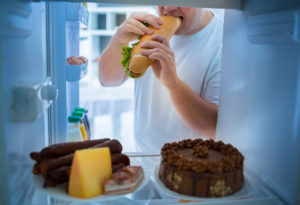An addict is someone who repeatedly uses a substance or partakes in an activity despite the potential harm that can come from it because they derive so much pleasure from it. The substances or activities that are most commonly associated with addiction include drugs, alcohol, tobacco or even gambling, but there is growing awareness that a person can have a food addiction.
Recent studies of the brain have concluded that compulsive overeating has the same effect on the pleasure centers of the brain as addictive drugs, such as cocaine or heroin. This is especially true of foods that are rich in sugar, fat, or salt.
These highly palatable foods trigger chemicals in the brain such as dopamine. Once a person experiences the pleasure associated with an increase in these chemicals in the brain, it will spark a reward signal to eat again. In some, these signals can override the feelings of fullness or satisfaction. As a result, a person with a food addiction will compulsively eat even when they are not hungry because of the intense pleasure they get from it.
People who show signs of a food addiction may develop a kind of tolerance to food. They will eat more and more, only to find that food satisfies them less and less. They will also continue to eat despite the negative consequences, and, similar to those who are addicted to drugs or gambling, people who are addicted to food will have trouble stopping their behavior.
Experts have created a survey tool to help professionals identify people who may have an addiction to food. This questionnaire includes questions, that ask the person if they:
- End up eating more than planned when eating certain foods.
- Keep eating certain foods even if no longer hungry.
- Eat to the point of feeling ill.
- Go out of the way to obtain certain foods when they are not available.
- Avoid professional or social situations where certain foods are available because of fear of overeating.
- Have problems functioning effectively at their job or school because of food and eating.
- Feel emotions such as guilt, anxiety, self-loathing or depression after eating.
Many believe that compulsive overeating and food addiction is more difficult to treat than other forms of addiction due to the fact that food is all around us. Alcoholics, for example, can remove themselves from situations where alcohol is present to help them abstain, but we all need to eat to survive and therefore we will always be exposed to situations where food is around.
There are a growing number of programs that can help people who are addicted to food. Many programs use a similar 12 step program that other addiction programs follow. Some food addiction programs also adopt a strict diet regimen that includes abstaining from problem ingredients, like sugar, refined flour, and wheat.
All content of this newsletter is intended for general information purposes only and is not intended or implied to be a substitute for professional medical advice, diagnosis or treatment. Please consult a medical professional before adopting any of the suggestions on this page. You must never disregard professional medical advice or delay seeking medical treatment based upon any content of this newsletter. PROMPTLY CONSULT YOUR PHYSICIAN OR CALL 911 IF YOU BELIEVE YOU HAVE A MEDICAL EMERGENCY.

